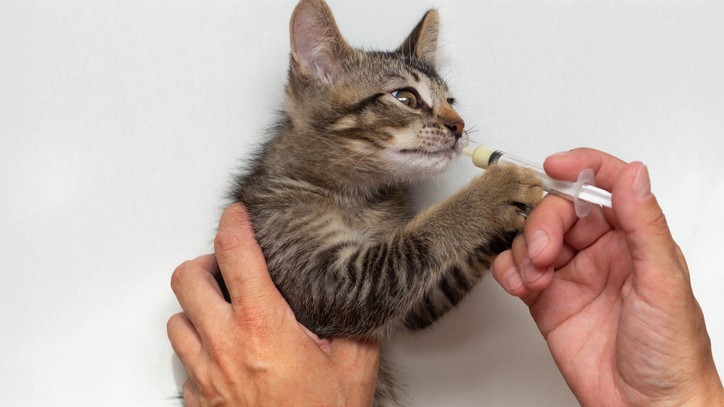We asked a vet how to treat a kitten with worms, here’s what they had to say
Vet reveals how to treat a kitten with worms — and it’ll have them back to their happy and healthy self in no time!

- How can you tell if a kitten has worms?
- How do you get rid of worms in kittens?
- How to treat roundworms in kittens
- How to treat tapeworms in kittens
- When can you treat kittens for worms?
- How long does it take for kittens to get rid of worms?
- Can kittens pass worms to humans?
- Can cat worms infest your house?
Get the best advice, tips and top tech for your beloved Pets
You are now subscribed
Your newsletter sign-up was successful
How to treat a kitten with worms is something you’re going to want to be aware of if you’ve recently welcomed a new bundle of fluff into your family. Many kittens are either born with intestinal worms or pick them up from their mother while nursing, so getting on top of this issue quickly is vital for their long-term health and wellbeing.
Intestinal parasites come in several different varieties, and it’s important to note that you can do everything right as a pet parent — feed your little one a diet of the best kitten food, provide them with plenty of love and affection, and groom them regularly — and they can still get worms. So rest assured that it’s not because you’re not a wonderful cat owner!
However, treatment is crucial for ensuring your kitten recovers quickly with no ongoing issues. If you suspect your kitten might have worms (key symptoms include vomiting, diarrhea, inability to put on weight and a dull coat) it’s vital you get them checked over by a vet as soon as possible.
There are lots of kitten care tips out there, but when it comes to keeping them physically healthy, treating intestinal worms and preventing them from reoccurring is top of the list. To help you understand everything you need to know about worms, including the different kinds, the best ways to treat them and how long it will take for them to clear, we turned to expert vet Dr. Catherine Barnette. Plus, Dr. Rebecca MacMillan weighs in on whether cats can pass worms to humans and if they can infect your home.

Dr. Catherine Barnette is a small animal veterinarian with 14 years of clinical experience in small animal general practice. She currently divides her time between part-time clinical practice and freelance writing, while also volunteering in her community. Her primary medical interests are preventive medicine and client education.

Dr. Rebecca MacMillan is a companion animal vet with over 13 years of experience treating and looking after pets. She graduated from the UK Royal Veterinary college in 2009, and has worked in several practices over the years. Rebecca is also an experienced writer, using her veterinary background to offer expert opinion and advice.
How can you tell if a kitten has worms?
Signs of intestinal worms can vary, depending on which type of worm is present and the severity of the infection. Some kittens with intestinal worms appear completely fine, with no signs of intestinal parasites, with the parasites discovered on a routine fecal parasite examination. In other cases, intestinal worms can cause significant illness.
When intestinal worms cause clinical signs in an affected kitten, common signs include:
- Diarrhea (may range from soft stools to watery or liquid diarrhea)
- Vomiting
- Poor weight gain
- Pot-bellied appearance
- Dull coat
- Visible worms in the feces or vomit
- Visible rice-like worm segments around the rectum
In many cases, there is considerable overlap between the signs caused by intestinal worms and those caused by other illnesses. If your kitten shows signs of vomiting or diarrhea, don’t assume that it’s simply due to intestinal worms. Instead, you should take your kitten to a veterinarian for evaluation. In addition to a thorough physical examination, your veterinarian will perform a fecal parasite examination. In this test, a sample of your kitten’s stool will be collected, processed, and examined under a microscope. A member of the veterinary team will look for eggs that indicate the presence of intestinal worms, as well as other organisms that may live in your kitten’s digestive tract.
Get the best advice, tips and top tech for your beloved Pets
If your cat is showing signs of gastrointestinal disease and your veterinarian does not find intestinal worms to explain your kitten’s signs of illness, they may test for other medical conditions. Learn more in our guides to Why is my cat losing weight? and Is my cat sick?
How do you get rid of worms in kittens?
Once your veterinarian determines what types of intestinal worms are affecting your kitten, he or she will prescribe an appropriate dewormer. There are multiple species of intestinal worms that affect kittens and each responds to different dewormers, so it’s important to have a definitive diagnosis before deworming your kitten.
Depending on the dewormer that your veterinarian prescribes, you may receive a pill, a liquid medication, or granules that you will mix with your kitten’s food. Most dewormers require repeated dosing to eliminate intestinal parasites. You will likely administer the dewormer once daily for one to five days, then repeat the treatment again in two to three weeks. Repeated treatment ensures that all life stages of the intestinal worms are addressed with deworming.
How to treat roundworms in kittens

Kittens are often born with roundworms, or become infected early in life. Most adult cats have at least a small number of encysted roundworm larvae within their tissues. Hormonal changes that occur during pregnancy activate these larvae and stimulate them to travel to the placenta or the mammary glands. Therefore, kittens may be infected with roundworms before birth or while nursing. When you take in a stray kitten, there is a relatively high likelihood that the kitten has roundworms.
Roundworms are typically treated with pyrantel. Pyrantel is administered as an oral liquid medication, given as a single dose that is repeated every two to three weeks until the parasites have been cleared. Pyrantel is available over-the-counter and can be purchased from pet supply stores or online pharmacies. However, it’s best to obtain a dewormer directly from your veterinarian. Your veterinarian can determine which intestinal parasites are affecting your kitten and ensure that your kitten receives the right dewormer, at the right dose, on the right timeline.
In some cases, your veterinarian may prescribe fenbendazole for your kitten’s roundworms due to its broader spectrum of activity. This dewormer is available only through a veterinarian. Fenbendazole may be administered as a liquid medication or as a powder that you add to your kitten’s food. Fenbendazole is often given for several days in a row, then repeated in three weeks.
How to treat tapeworms in kittens
Tapeworms are intestinal parasites that are spread by fleas. Cats that have fleas often ingest live fleas during grooming, and these fleas may contain tapeworm eggs. Once inside the cat’s body, these tapeworm eggs mature and develop into adult worms that live within the cat’s intestine. Most owners become aware of their cat’s tapeworm infection when they notice small worm segments, which look like grains of rice, around their cat’s rectum.
Tapeworms are treated with praziquantel, a drug that specifically targets tapeworms. This drug is only available from veterinarians. (Over-the-counter dewormers will not treat tapeworms.) In order to prevent recurrence of tapeworms, it’s important to ensure that your cat is on the best flea treatment for cats, all year round.
When can you treat kittens for worms?

Each feline dewormer has a different minimum age requirement. Pyrantel and fenbendazole can both be used in kittens as young as two weeks of age. Praziquantel (used to treat tapeworms) is not typically administered until kittens reach at least six weeks of age.
How long does it take for kittens to get rid of worms?
"A veterinary-approved deworming product can start to kill worms within hours of administration," explains MacMillan. "The important thing to know is that deworming products have no lasting protective effects in your kitten’s body. This is why repeat administration at regular intervals is often required. This ensures that the entire worm population has been destroyed as well as killing off any further worms that may have entered your pet’s system.
Dead adult worms may be seen in your kitten’s feces after treatment, but this isn’t always the case. If you are using the product as directed by your vet, then you can be assured that it is effective, and your feline friend will soon be worm-free!"
Can kittens pass worms to humans?
"While uncommon, humans can become infected with worms carried by their cats. Roundworm eggs are most likely to cause problems if accidentally swallowed, with the hatching larvae migrating around the body through the liver, lungs, and eyes. In children, this can cause severe eye damage (blindness)," explains MacMillan. "Good hygiene such as washing your hands after handling your cat or their litter tray, as well as regularly de-worming your pet will reduce the risk of this occurring."
Can cat worms infest your house?
"The actual worms live inside their host (your pet) with their microscopic eggs being passed out into the environment through your cat’s feces. These eggs could be present in your cat’s litter tray, on their bedding, and can be spread through their fur during grooming," MacMillan says. "Roundworm eggs can survive for several months in the environment under the right conditions. So, in that respect worms can ‘infest’ the house which is why regular de-worming of your cat is recommended using a veterinary-approved product."
Your veterinarian is the best possible resource when seeking information on how to treat a kitten with worms. Your veterinarian will perform a fecal parasite examination to determine which intestinal parasites are affecting your kitten, then prescribe an appropriate treatment to eliminate your kitten’s parasite infection. Intestinal worm treatments are highly effective, so following your veterinarian’s recommendations will ensure that your kitten becomes parasite-free as quickly as possible.
If you found this piece useful and are looking for more advice and guidance to help your feline friend thrive in the first year of life, our five essential kitten training tips have got you covered. Or, if your kitten is always hungry, read our feature on why that might be.
Dr. Barnette is a graduate of the University of Florida, where she received both her B.S. in Zoology and her Doctor of Veterinary Medicine (DVM). She has 15 years of clinical experience as a small animal veterinarian, treating dogs, cats, and occasional exotic patients. She now works as a freelance veterinary writer, creating educational content for veterinarians, veterinary team members, and dedicated pet owners. Dr. Barnette lives in southwest Florida with her husband and daughter (plus two cats, a dog, and a rescued dove!) and enjoys kayaking, biking, and hiking. Learn more about Dr. Barnette at www.linkedin.com/in/catherinebarnette.

